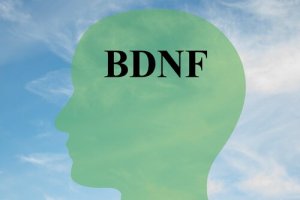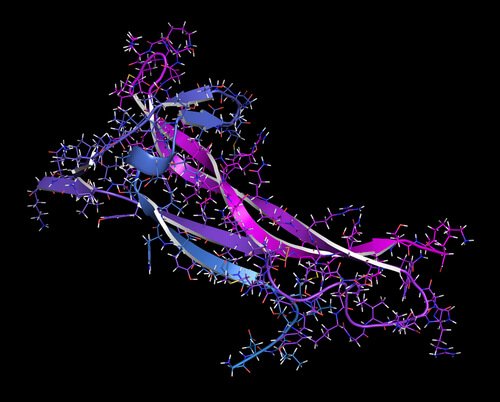How to Increase BDNF, A Key Protein for Healthy Brain Cells

Brain-derived neurotrophic factor (BDNF) is a powerful protein that stimulates the production of new brain cells and strengthens existing ones. More specifically, releasing BDNF activates a series of genes that develop new cells and brain pathways. Thus, having high BDNF makes you learn faster, remember better, age more slowly, and reconnect your brain quickly. In this article, we explain how to increase BDNF to promote all of this.
Until fairly recently, it was wrongly believed that humans are born with a certain number of brain cells and that you could never develop new ones. But in the early 1980s, researchers discovered and isolated a protein that stimulated the growth of new brain cells. They called this protein brain-derived neurotrophic factor or BDNF. But BDNF does a lot more than just cause new brain cells to grow.
BDNF also keeps the existing brain cells healthy through a series of mechanisms. It increases the brain’s plasticity, suppresses brain inflammation, acts as a natural antidepressant, counteracts the negative effects of stress on the brain, and protects the brain from neurodegenerative diseases. Evidence suggests it can even control lifespan.
Why might BDNF be low?
Low BDNF has been linked to many brain-related conditions. These include anxiety disorders, depression, obsessive-compulsive disorder, eating disorders, schizophrenia, dementia, Huntington’s disease, Alzheimer’s disease, post-traumatic stress disorder, burnout syndrome, and suicidal behavior. It’s not clear whether low BDNF causes these disorders or is a side effect of them.
However, evidence clearly indicates that an unhealthy lifestyle adversely affects BDNF levels. In this sense, research has found that diets high in processed foods, especially those that combine high levels of sugar and fat, decrease BDNF.

Stress and BDNF are also intimately related. Thus, stress affects the body by decreasing our BDNF levels. Research has found that the stress hormone cortisol stops the production of BDNF, which results in the formation of fewer brain cells.
No matter the stimulus that causes stress, all stress reduces BDNF production. Chronic daily stress, occasional acute stress, chronic insomnia due to stress, and exhaustion lead to a decrease in BDNF.
In addition, like many other things that change as we get older, BDNF levels naturally decrease with age.
How to increase BDNF naturally
The only way to increase BDNF is through natural methods. Attempts have been made to develop oral methods and injections, but thus far the BDNF introduced in these ways hasn’t crossed the protective blood-brain barrier.
For now, the best ways to increase BDNF involve improving our lifestyle by making healthy diet and exercise changes. Some foods and supplements help increase BDNF levels. However, the best way to increase BDNF levels is physical exercise.
Physical exercise to increase BDNF
Increased BDNF levels through exercise can make the brain more resistant to oxidative stress damage, injury, and disease. The link between BDNF and exercise has been known for a long time, but researchers have recently discovered that exercise actually activates the gene that sends a signal to create more BDNF.
In addition, in the case of insomnia, research found that exercise can also offset part of the negative impact that sleep deprivation has on BDNF levels.
All types of exercise help increase BDNF, but some types work better than others. Dr. John Ratey, a psychiatrist at Harvard Medical School and one of the world’s leading authorities on the connection between brain health and exercise, says that as little as 10 minutes of exercise has positive effects on the brain. Dr. Ratey believes that varying your exercise routine and performing sprint bursts help obtain the maximum cognitive benefit.
Other forms of exercise that have been found to increase BDNF include yoga, dance, endurance training, and high-impact running.
Activities to increase BDNF
In addition to exercising, there are other activities that increase BDNF. They include:
- Spending time outside in the sun. Sun exposure increases BDNF, but taking a vitamin D supplement does not, according to research. Moreover, people suffering from seasonal affective disorder may have low BDNF.
- Listening to music. Research has found that listening to music affects BDNF production.
- Spending time in good company. Social relationships could improve brain health by increasing BDNF levels, as research shows.

Increase BDNF by improving your diet
It has been found that the Mediterranean diet increases BDNF levels. In fact, when comparing diets and meal plans, the Mediterranean diet is almost always the best. It’s often considered the healthiest way to eat.
However, to optimize BDNF, it’s important to not eat too much, even if you consume healthy foods. It has been shown that restricting calories increases BDNF. Another diet that increases BDNF is the ketogenic diet that’s high in fat and low in carbohydrates.
In any case, it’s important to know that diets rich in sugar and saturated fats decrease BDNF according to research.
Some specific foods are known to increase BDNF. These foods have one thing in common: they are rich in compounds called flavonoids. Flavonoids occur naturally in plants and offer both cognitive and physical benefits. Flavonoids are powerful antioxidant and anti-inflammatory agents. They also stimulate BDNF production.
Due to their high flavonoids contents, cranberries, chocolate, green tea, olive oil, spices, black pepper, and turmeric increase BDNF. It has also been found that prebiotic foods promote BDNF production. In this regard, the most interesting prebiotic foods are asparagus, bamboo shoots, bananas, barley, chocolate, leeks, garlic, jicama, lentils, mustard greens, onions, and tomatoes.
Brain-derived neurotrophic factor (BDNF) is a powerful protein that stimulates the production of new brain cells and strengthens existing ones. More specifically, releasing BDNF activates a series of genes that develop new cells and brain pathways. Thus, having high BDNF makes you learn faster, remember better, age more slowly, and reconnect your brain quickly. In this article, we explain how to increase BDNF to promote all of this.
Until fairly recently, it was wrongly believed that humans are born with a certain number of brain cells and that you could never develop new ones. But in the early 1980s, researchers discovered and isolated a protein that stimulated the growth of new brain cells. They called this protein brain-derived neurotrophic factor or BDNF. But BDNF does a lot more than just cause new brain cells to grow.
BDNF also keeps the existing brain cells healthy through a series of mechanisms. It increases the brain’s plasticity, suppresses brain inflammation, acts as a natural antidepressant, counteracts the negative effects of stress on the brain, and protects the brain from neurodegenerative diseases. Evidence suggests it can even control lifespan.
Why might BDNF be low?
Low BDNF has been linked to many brain-related conditions. These include anxiety disorders, depression, obsessive-compulsive disorder, eating disorders, schizophrenia, dementia, Huntington’s disease, Alzheimer’s disease, post-traumatic stress disorder, burnout syndrome, and suicidal behavior. It’s not clear whether low BDNF causes these disorders or is a side effect of them.
However, evidence clearly indicates that an unhealthy lifestyle adversely affects BDNF levels. In this sense, research has found that diets high in processed foods, especially those that combine high levels of sugar and fat, decrease BDNF.

Stress and BDNF are also intimately related. Thus, stress affects the body by decreasing our BDNF levels. Research has found that the stress hormone cortisol stops the production of BDNF, which results in the formation of fewer brain cells.
No matter the stimulus that causes stress, all stress reduces BDNF production. Chronic daily stress, occasional acute stress, chronic insomnia due to stress, and exhaustion lead to a decrease in BDNF.
In addition, like many other things that change as we get older, BDNF levels naturally decrease with age.
How to increase BDNF naturally
The only way to increase BDNF is through natural methods. Attempts have been made to develop oral methods and injections, but thus far the BDNF introduced in these ways hasn’t crossed the protective blood-brain barrier.
For now, the best ways to increase BDNF involve improving our lifestyle by making healthy diet and exercise changes. Some foods and supplements help increase BDNF levels. However, the best way to increase BDNF levels is physical exercise.
Physical exercise to increase BDNF
Increased BDNF levels through exercise can make the brain more resistant to oxidative stress damage, injury, and disease. The link between BDNF and exercise has been known for a long time, but researchers have recently discovered that exercise actually activates the gene that sends a signal to create more BDNF.
In addition, in the case of insomnia, research found that exercise can also offset part of the negative impact that sleep deprivation has on BDNF levels.
All types of exercise help increase BDNF, but some types work better than others. Dr. John Ratey, a psychiatrist at Harvard Medical School and one of the world’s leading authorities on the connection between brain health and exercise, says that as little as 10 minutes of exercise has positive effects on the brain. Dr. Ratey believes that varying your exercise routine and performing sprint bursts help obtain the maximum cognitive benefit.
Other forms of exercise that have been found to increase BDNF include yoga, dance, endurance training, and high-impact running.
Activities to increase BDNF
In addition to exercising, there are other activities that increase BDNF. They include:
- Spending time outside in the sun. Sun exposure increases BDNF, but taking a vitamin D supplement does not, according to research. Moreover, people suffering from seasonal affective disorder may have low BDNF.
- Listening to music. Research has found that listening to music affects BDNF production.
- Spending time in good company. Social relationships could improve brain health by increasing BDNF levels, as research shows.

Increase BDNF by improving your diet
It has been found that the Mediterranean diet increases BDNF levels. In fact, when comparing diets and meal plans, the Mediterranean diet is almost always the best. It’s often considered the healthiest way to eat.
However, to optimize BDNF, it’s important to not eat too much, even if you consume healthy foods. It has been shown that restricting calories increases BDNF. Another diet that increases BDNF is the ketogenic diet that’s high in fat and low in carbohydrates.
In any case, it’s important to know that diets rich in sugar and saturated fats decrease BDNF according to research.
Some specific foods are known to increase BDNF. These foods have one thing in common: they are rich in compounds called flavonoids. Flavonoids occur naturally in plants and offer both cognitive and physical benefits. Flavonoids are powerful antioxidant and anti-inflammatory agents. They also stimulate BDNF production.
Due to their high flavonoids contents, cranberries, chocolate, green tea, olive oil, spices, black pepper, and turmeric increase BDNF. It has also been found that prebiotic foods promote BDNF production. In this regard, the most interesting prebiotic foods are asparagus, bamboo shoots, bananas, barley, chocolate, leeks, garlic, jicama, lentils, mustard greens, onions, and tomatoes.
This text is provided for informational purposes only and does not replace consultation with a professional. If in doubt, consult your specialist.







